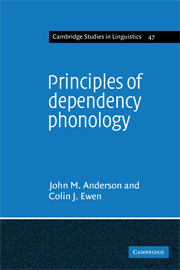Preface
Published online by Cambridge University Press: 04 August 2010
Summary
Books which, like the present one, set out to provide a detailed account of a particular current approach to some general area of study, in this case phonological representation, can, in a sense, never be ‘timely’ overall. The framework under discussion is in a continuous state of development, both in terms of its own internal evolution as it interacts which an expanding range of phenomena for which it has to provide descriptions, and with respect to how it is defined in relation to rival and complementary approaches to what can be taken, pre-theoretically, to be the same (or a similar) domain, themselves also subject to constant revision. In addition, despite authorial attempts at consistency, the time which is required for the development of an extended presentation of this sort almost inevitably leaves marks of the work's history, in the form, for instance, of sections associated with different stages in its evolution. These remarks are not intended as any sort of apologia for the present work specifically; as we have indicated, it seems to us that the ‘timing’ problem faces any such undertaking. However, they may throw some light on the form taken by the following discussion.
In particular, we have concentrated on the explication of notions which have remained central to the framework of dependency phonology since its inception in the work of Anderson & Jones in the early 1970s, such as the single-valued feature, or component, hypothesis, and of course the relevance of the dependency relations to different domains, both segmental and suprasegmental.
- Type
- Chapter
- Information
- Principles of Dependency Phonology , pp. ix - xPublisher: Cambridge University PressPrint publication year: 1987



